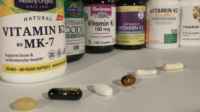Our Members Asked:
I'm considering taking vitamin K for my bones, but I take blood thinner (anticoagulant) medication. Is there a problem taking both?

Answer:
In addition to vitamin K playing a role in bone health, it helps make proteins needed for clotting. Anticoagulant drugs like warfarin (Coumadin and Jantoven) work by blocking the production of those clotting proteins, helping to "thin" the blood and prevent clotting. Not surprisingly, increasing your intake of vitamin K long-term may require you to slightly increase the dose of these blood thinners and, similarly, people taking these blood thinners are advised to avoid wide fluctuations in their vitamin K intake.
Although low-dose vitamin K supplementation (100 to 200 mcg of vitamin K1 daily) was previously recommended to help stabilize fluctuations in blood clotting in people taking warfarin, experts now recommend against doing this (for more details, see the What It Does section of the Vitamin K Supplements Review).
Because vitamin K2 from food is associated with a reduced risk of coronary calcification and mortality from coronary heart disease, some people assume it is safer to take this form with warfarin than vitamin K1. In addition, the MK-7 form of vitamin K2 has a longer half-life than K1, which may account for better stability of INR values (a clotting measurement) for people on anticoagulant therapy. However, MK-7 has been shown to interfere with anticoagulant therapy, and at much lower doses than vitamin K1. For more details, see the Concerns and Cautions section of the Vitamin K Supplements Review.
(Be aware that CoQ10 is chemically similar to vitamin K2 and may also decrease the effects of warfarin, although the evidence for this is mixed. See Concerns and Cautions in the CoQ10 Supplements Review).
Unlike warfarin, some newer blood thinning drugs, such as dabigatran (Pradaxa), apixaban (Eliquis) and rivaroxaban (Xarelto) are not thought to be affected by vitamin K intake. However, some of these drugs can be affected by other supplements (for more details, see our answer to the question: Are there supplements I should avoid when taking apixaban (Eliquis) or similar blood thinner drugs?).
Another way to prevent clots is by taking aspirin or related drugs, but these work in a different way - preventing platelets from clumping together to form clots. There does not appear to be evidence of vitamin K interacting with antiplatelet drugs.
Join today to unlock all member benefits including full access to all CL Answers and over 1,400 reviews.
Join NowAlready a member? Sign In Here.
Join now at www.consumerlab.com/join/







Submit your comment
This feature is restricted to active members.
Join now to add comments and get all member benefits, including over 1,400 reviews.
Join NowAlready a member? Sign in here.